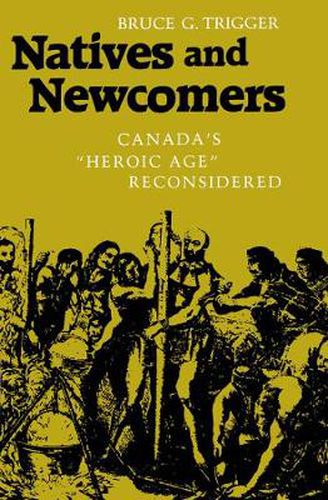Readings Newsletter
Become a Readings Member to make your shopping experience even easier.
Sign in or sign up for free!
You’re not far away from qualifying for FREE standard shipping within Australia
You’ve qualified for FREE standard shipping within Australia
The cart is loading…






According to conventional 19th-century wisdom, societies of European origin were naturally progressive; native societies were static. One consequence of this attitude was the almost universal separation of history and anthropology. Today, despite a growing interest in changes in Amerindian societies, this dichotomy continues to distort the investigation of Canadian history and to assign native peoples only a marginal place in it. This work discredits that myth. In a critical re-examination of relations between the French and the Iroquoian-speaking inhabitants of the St Lawrence lowlands, from de Champlain and the Jesuit missions into the early years of the royal regime, the book argues that native people have played a significant role in shaping the development of Canada. Trigger also shows that the largely ignored French traders and their employees established relations with native people that were indispensable for founding a viable European colony on the St Lawrence. The narrative of this period is complemented by a detailed survey of the stereotypes about native people that have influenced the development of North American history and anthropology and by candid discussions of how historical, ethnographical, and archaeological approaches can and cannot be combined to produce a more rounded and accurate understanding of the past.
$9.00 standard shipping within Australia
FREE standard shipping within Australia for orders over $100.00
Express & International shipping calculated at checkout
According to conventional 19th-century wisdom, societies of European origin were naturally progressive; native societies were static. One consequence of this attitude was the almost universal separation of history and anthropology. Today, despite a growing interest in changes in Amerindian societies, this dichotomy continues to distort the investigation of Canadian history and to assign native peoples only a marginal place in it. This work discredits that myth. In a critical re-examination of relations between the French and the Iroquoian-speaking inhabitants of the St Lawrence lowlands, from de Champlain and the Jesuit missions into the early years of the royal regime, the book argues that native people have played a significant role in shaping the development of Canada. Trigger also shows that the largely ignored French traders and their employees established relations with native people that were indispensable for founding a viable European colony on the St Lawrence. The narrative of this period is complemented by a detailed survey of the stereotypes about native people that have influenced the development of North American history and anthropology and by candid discussions of how historical, ethnographical, and archaeological approaches can and cannot be combined to produce a more rounded and accurate understanding of the past.